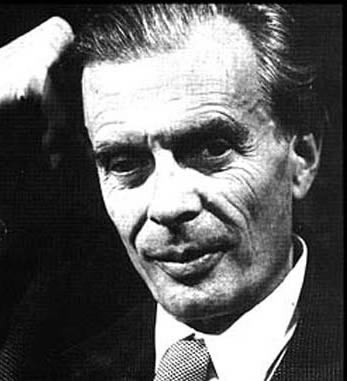Aldous Huxley Quotes
An intellectual is a person who has discovered something more interesting than sex.
Chastity - the most unnatural of all the sexual perversions.
Writers write to influence their readers, their preachers, their auditors, but always, at bottom, to be more themselves.
We can pool information about experiences, but never the experiences themselves. From family to nation, every human group is a society of island universes.
The deepest sin against the human mind is to believe things without evidence.
Actual happiness always looks pretty squalid in comparison with the overcompensations for misery. And, of course, stability isn't nearly so spectacular as instability. And being contented has none of the glamour of a good fight against misfortune, none of the picturesqueness of a struggle with temptation, or a fatal overthrow by passion or doubt. Happiness is never grand.
That men do not learn very much from the lessons of history is the most important of all the lessons that History has to teach.
At least two-thirds of our miseries spring from human stupidity, human malice and those great motivators and justifiers of malice and stupidity: idealism, dogmatism and proselytizing zeal on behalf of religous or political ideas.
You never see animals going through the absurd and often horrible fooleries of magic and religion. . . . Dogs do not ritually urinate in the hope of persuading heaven to do the same and send down rain. Asses do not bray a liturgy to cloudless skies. Nor do cats attempt, by abstinence from cat's meat, to wheedle the feline spirits into benevolence. Only man behaves with such gratuitous folly. It is the price he has to pay for being intelligent but not, as yet, quite intelligent enough.
Perhaps it's good for one to suffer. Can an artist do anything if he's happy? Would he ever want to do anything? What is art, after all, but a protest against the horrible inclemency of life?
God isn't compatible with machinery and scientific medicine and universal happiness. You must make your choice. Our civilization has chosen machinery and medicine and happiness.
Universal education has created an immense class of what I may call the New Stupid, hungering for certainty yet unable to find it in the traditional myths and their rationalizations.
Love casts out fear; but conversely fear casts out love. And not only love. Fear also casts out intelligence, casts out goodness, casts out all thought of beauty and truth. What remains in the bum or studiedly jocular desperation of one who is aware of the obscene Presence in the corner of the room and knows that the door is locked, that there aren’t any windows.
Happiness is not achieved by the conscious pursuit of happiness; it is generally the by-product of other activities.
"There's only one corner of the universe you can be certain of improving, and that's your own self. Your own self," he repeated. So you have to begin there, not outside, not on other people. That comes afterwards, when you've worked on your own corner.
The real hopeless victims of mental illness are to be found among those who appear to be most normal. "Many of them are normal because they are so well adjusted to our mode of existence, because their human voice has been silenced so early in their lives, that they do not even struggle or suffer or develop symptoms as the neurotic does." They are normal not in what may be called the absolute sense of the word; they are normal only in relation to a profoundly abnormal society. Their perfect adjustment to that abnormal society is a measure of their mental sickness. These millions of abnormally normal people, living without fuss in a society to which, if they were fully human beings, they ought not to be adjusted.
One Folk, One Realm, One Leader. Union with the unity of an insect swarm. Knowledgeless understanding of nonsense and diabolism. And then the newsreel camera had cut back to the serried ranks, the swastikas, the brass bands, the yelling hypnotist on the rostrum. And here once again, in the glare of his inner light, was the brown insectlike column, marching endlessly to the tunes of this rococo horror-music. Onward Nazi soldiers, onward Christian soldiers, onward Marxists and Muslims, onward every chosen People, every Crusader and Holy War-maker. Onward into misery, into all wickedness, into death!
It is man's intelligence that makes him so often behave more stupidly than the beasts. ... Man is impelled to invent theories to account for what happens in the world. Unfortunately, he is not quite intelligent enough, in most cases, to find correct explanations. So that when he acts on his theories, he behaves very often like a lunatic.
A belief in hell and the knowledge that every ambition is doomed to frustration at the hands of a skeleton have never prevented the majority of human beings from behaving as though death were no more than an unfounded rumor.
If you look up 'Intelligence' in the new volumes of the Encyclopeadia Britannica, you'll find it classified under the following three heads: Intelligence, Human; Intelligence, Animal; Intelligence, Military. My stepfather's a perfect specimen of Intelligence, Military.
It is a bit embarrassing to have been concerned with the human problem all one's life and find at the end that one has no more to offer by way of advice than 'try to be a little kinder.


